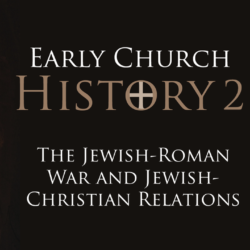 Pastor Daniel Calcagno lays out a his case for what he calls a positive view of Torah. He believes that the cleavage with Judaism in early church history is something the apostles never envisioned. Sadly, this parting of the ways led to confusion, doctrinal drifting, and persecution. Although Calcagno does not believe Gentiles need to keep the Law, he sees no reason for Jews to stop observing Torah.
Pastor Daniel Calcagno lays out a his case for what he calls a positive view of Torah. He believes that the cleavage with Judaism in early church history is something the apostles never envisioned. Sadly, this parting of the ways led to confusion, doctrinal drifting, and persecution. Although Calcagno does not believe Gentiles need to keep the Law, he sees no reason for Jews to stop observing Torah.
Here are his notes:
TOWARDS A POSITIVE VIEW OF THE TORAH
by Daniel Calcagno
Restoring the Jewish Identity Markers to the Church
The Hebrew word “torah” means “instruction” and refers primarily to the first five books of the Bible but more specifically can refer to the commandments of God in those books.
In this podcast, Daniel attempted to show that it is biblical and proper for a disciple of Jesus to have a positive view of the Torah, specifically those elements of the Torah that are usually associated with Jewish identity (i.e. the Sabbath, the festivals, keeping kosher, etc.).
The Torah’s own presentation of the enduring nature of the commandments associated with Jewish identity:
The Sabbath: Exodus 31:13
Passover: Exodus 12:14
The Day of Atonement: Leviticus 16:29
The Aaronic priesthood: Exodus 29:9
Sign of a False Prophet: Deuteronomy 13:1-5
Positive Statements about the Torah in the rests of the Hebrew Scriptures: Psalm 19; Psalm 119; Joshua 1:7-8; Jeremiah 9:12-13; Malachi 4:4; Ecclesiastes 12:13.
Jesus and the Apostles were Torah-observant:
The Sabbath: Luke 4:16-17; Mark 1:21; Luke 23:56
Passover: Luke 22:15-20; 1 Corinthians 5:6-8
Pentecost: Acts 2:1; Acts 20:16, 1 Corinthians 16:8-9
The Day of Atonement: Acts 27:9
The Feast of Booths: John 7:2, 10, 14, 37
Hanukkah (extra-biblical Jewish holiday): John 10:22-23
Daily Jewish Prayer: Acts 2:42, 3:1, 6:4
Liturgical Blessings: Matthew 14:19-20, 26:27; Acts 27:35
Tzitzit: Matthew 9:20-21
Keeping Kosher: Acts 10:14
Circumcision: Luke 1:59-60, 2:21, Philippians 3:5, Acts 16:3
Offering Sacrifices: Acts 24:17
Baptism/Ritual Immersion: Acts 2:41, 9:18
They Torah will be observed in the kingdom: Isaiah 2:3; Isaiah 66:23; Ezekiel 45:17; Zechariah 14:16-17; Isaiah 56:6-8
Positive Statements about the Torah by Jesus: Matthew 5:17-19; Matthew 23:23
Paul was a Torah-observant Jew:
Paul was born to Jewish parents: Philippians 3:5
His name was both Saul and Paul: Acts 13:9
Paul was educated under Rabbi Gamaliel: Acts 22:3
Paul attended synagogue on the Sabbath: Acts 17:2-3, 18:3-5
He said that served God “…believing everything that is in accordance with the Torah…” (Acts 24:14).
He testified that he had “…committed no offense either against the Law of the Jews” (Acts 25:8).
He was NOT teaching the Jewish people to forsake Moses, to not circumcise their children, nor keep Jewish tradition. James said about Paul: “…there is nothing to the things which they have been told about you, but that you yourself also walk orderly, keeping the Torah.” (Acts 21:24).
Positive Statements about the Torah by Paul:
Paul said “…it is not the hearers of the Torah who are just before God, but the doers of the Torah will be justified.” (Romans 2:13).
He said “Do we then nullify the Torah through faith? May it never be! On the contrary, we establish the Torah.” (Romans 3:31).
He said “the Torah is holy, and the commandment is holy and righteous and good.” (Romans 7:12).
He said “…I joyfully concur with the Torah of God in the inner man” (Romans 7:22).
He said “…the mind set on the flesh is hostile toward God; for it does not subject itself to the Torah of God…” (Romans 8:7).
In Romans 9:4, he listed the giving of the Torah as one of the blessings God has given to Israel.
In 1 Corinthians 7:19, he said that “Circumcision is nothing, and uncircumcision is nothing, but what matters is the keeping of the commandments of God.” (1 Corinthians 7:19), which I believe means that Jewish and Gentile identity don’t matter as long one is faithful to the commandments God requires each to keep.
He said that followers of Jesus were not “…without the law of God but under the law of Christ,” (1 Corinthians 9:21) which I believe means the Torah as taught by Christ.
Paul charged Timothy to “…keep the commandment without stain or reproach until the appearing of our Lord Jesus Christ” (1 Timothy 6:14). The phrase “the Commandment” was used by Paul to refer to the Torah in Romans 7 and is found in Psalm 19:8 referring to the Torah.
Paul said to Timothy that “All Scripture is inspired by God and profitable for teaching, for reproof, for correction, for training in righteousness,” (1 Timothy 3:16), “all Scripture,” of course, includes the Torah.
The importance of the salvation of the Jewish people and how having a positive view of the Torah might affect that.
In Romans 1:16, Paul said that the Gospel is a message firstly for Jewish people. And he said in Romans 9:3 that he would give up his own salvation for the salvation of the Jewish people.
In Matthew 23:39, Jesus said to the Jewish people that they won’t see him again until they say “Blessed is He who comes in the name of the Lord!” (Matthew 23:39). And Paul said this in Romans 11: “For if their rejection is the reconciliation of the world, what will their acceptance be but life from the dead?” (Romans 11:15). I believe that when the Jewish people embrace Jesus as the Messiah, it will bring about the kingdom.
A major reason why the Jewish people reject Jesus as the Messiah is they believe that he is a false prophet according to Deuteronomy 13. The Jewish people will never accept Jesus as the Messiah if we continue to present him and Paul as teachers who taught against the Torah.
ANSWERING OBJECTIONS
Objection: “We’re saved by grace, so we don’t need to keep the Law.”
Answer: Salvation has always been by grace through faith. The Torah does not save you; it provides God’s people with a way of life.
The Apostolic message of salvation by grace through faith is based on the Hebrew Scriptures: Isaiah 53:10; Psalm 16:10; 2 Timothy 3:15; Galatians 3:6-9.
The Torah Points to Jesus: Luke 24:25-27; 44-47; John 5:46-47; Romans 10:4; Galatians 3:24.
The people before Jesus were not saved by keeping the commandments or through the sacrifices, but were saved by grace through faith: Galatians 2:21; Hebrews 10:4; 11:39; John 14:6.
Jesus proclaimed that “…Abraham rejoiced to see my day, and he saw it and was glad” (John 8:56) and, in Galatians 3:6-9, the Apostle Paul taught that Abraham was saved by faith.
“…if righteousness comes through the Law, then Christ died needlessly.” (Galatians 2:21)
“For it is impossible for the blood of bulls and goats to take away sins.” (Hebrews 10:4)
The animal sacrifices were for the purpose of securing ritual purity so that the believer could draw near to God in worship at the Temple in Jerusalem. This is why the death of Jesus is likened unto a sacrifice (cf. 1 Peter 1:18-19), since his death secures eternal salvation so that the believer can be forgiven of their sins and gain immortality in the resurrection. The death of the Messiah did not do away with the animal sacrifices because the animal sacrifices would still serve the same purpose today if the Temple were to be rebuilt.
The letter to the Hebrews does not teach that the Law is done away with or that the Temple/Aaronic priesthood are done away with. Hebrews teaches that the Jerusalem Temple/Aaronic priesthood/animal sacrifices are for this age, but the sacrifice of Jesus and the priesthood of Melchizedek in the heavens are for the age to come. He even says in Hebrews 2:5 that it is the age to come that they are speaking about.
Objection: We’re in the New Covenant now, we don’t need to keep the Law.
Answer: The New Covenant does not replace any of the previous covenants.
Abrahamic: blessings, many descendants, the land of Israel forever, etc. (Genesis 12:1-3, 7; 15; 17:1-14).
Sinai: blessings for obedience/curses for disobedience to the Torah (Exodus 19; 24; Deuteronomy 27-29).
David: a descendant of David will rule as king over Israel forever as long as he is obedient to God’s commandments (2 Samuel 7:9-16).
Israel’s failure to keep the Sinai covenant does not invalidate the covenant made with Abraham (Galatians 3:15-17) and every new generation has the opportunity to keep the Sinai covenant.
In fact, the New Covenant is an agreement made with Israel that consists of promises made by God that He will forgive Israel of their sins, enter into relationship with each person among Israel, and write the Torah on their hearts, causing them to obey His commandments (Jeremiah 31:31-34; Ezekiel 36:24-28).
When the New Covenant is fully realized, Israel will finally become faithful to the Sinai covenant as a nation, which will ensure the regathering of the exiles back to the land of Israel, blessing in the land of Israel, a rebuilt Temple, and the Davidic king, Jesus the Messiah, reigning over them. In other words, in the Messianic era and beyond, all previous covenant promises will be finally and fully realized.
All true believers in every generation have received a spiritual foretaste of this coming reality (Ephesians 1:13-14).
None of God’s covenants are the “old covenant” in the sense that Paul used the term in the one place in the Bible the term is used (2 Corinthians 3:14; cf. Ephesians 4:22; Romans 6:6).
Objection: “We’re a part of the Church, not Israel, so we don’t need to keep the Law.”
Answer: The Church is not distinct from Israel; therefore we have a connection to the Torah.
Believing Jewish people and Gentiles are indeed the Messiah’s community (normally referred to as the Church), but this community is not distinct from Israel, especially since those Jewish people within this community obviously remain a part of Israel. Salvation spiritually brings Gentiles into Abraham’s family and the commonwealth of Israel as participants in the covenants of the promise (Galatians 3:29; Ephesians 2:11-13).
Romans 11:17-21 — The Messiah’s community cannot be considered an entity distinct from Israel, because it is made up of faithful Jewish people (the branches that remain on the tree)! Gentile believers too are not distinct from Israel because even though Gentile believers are not Jewish, we are united with believing Jewish people in the Messiah’s community (grafted onto the tree).
So, the Messiah’s community is not a new entity that replaces Israel, but is instead made up of faithful Jewish people and believers from among the nations; together we constitute those who are witnesses for the Messiah. It is impossible to make a rigid distinction between the church and Israel
Objection: “We’re Gentiles, not Jews, so we don’t need to keep the Law.”
Answer: Being a Gentile does not mean you have no relationship to the Torah.
Acts 15:1 — The common notion among the Jewish people in the first century was that being legally counted among the Jewish people (either through birth or conversion) and keeping the Torah was what mattered when it comes to salvation. Those who were not legally Jewish could not be saved. This is analogous to Christians thinking that membership in their church and abiding by their beliefs/practices is what guarantees salvation. Galatians 2:1-3 | Acts 15:11 | Acts 15:19-20 | Galatians 5:2; 3:7
If Gentile believers do not need to become legally Jewish in order to be counted among God’s people, do we have any obligation to the commandments of the Torah? Yes! All people are obligated to recognize the one true God and to love Him with complete devotion. This means that any commandment in the Torah that deals with areas of idolatry or blasphemy apply to everyone. Additionally, all people must obey the commandments of the Torah that deal with murder, theft, sexual immorality, and other ethical issues.
But what about those commandments of the Torah that were given directly to Israel: the Sabbath, the holidays, the kosher laws, and more? Put simply, God will not punish a Gentile who does not keep those commandments.
That being said, when Gentiles become believers, they are to take on a life of imitation of Jesus, the perfectly Torah-observant Messiah of Israel. Jesus said in Luke: “A pupil is not above his teacher; but everyone, after he has been fully trained, will be like his teacher” (Luke 6:40) and John said: “…the one who says he abides in [Jesus] ought himself to walk in the same manner as he walked” (1 John 2:6).
The Apostles envisioned that the Gentile believers would be congregating in the synagogues along with the Jewish people to listen to the Torah (Acts 15:21). It is unlikely that the Apostles envisioned the Gentiles eventually creating a new religion distinct from Israel and distinct from the practices of the Torah.
—— Links ——
- Follow Daniel Calcagno on Twitter, YouTube, or at MessianicNiagara.com
- Visit him at Glad Tidings Church of God in Fonthill, Ontario, Canada
- Listen to more Restitutio interviews here
- Intro music: Jazzy Frenchy by bensound.com. Licensed under Creative Commons: By Attribution 3.0 License.







1 Cor 11:1
Imitate me, just as I also imitate Christ
You remember that infamous phrase back in the 1990’s “WWJD?” What Would Jesus Do? Yeah that one haha. That one is the phrase that got me thinking though. Such simple phrases that got me thinking more though. It was one of the same reasons that really got me to start studying biblical unitarianism when I was a Trinitarian. Jesus clearly has one God, so those who follow him should too…right? Is that far-fetched?
For that same reason I began to challenge my views of the Torah(which were formerly like yours Sean) since Jesus kept the Torah(as you admitted clearly in this discussion) to be sinless. So can it be wrong to do what Jesus did/does? Well, no of course not–even as a Gentile. And don’t think it came easy… no no… my first challenge came from Matthew Janzen(who would be another great knowledgeable interviewee on this subject and preterism if you’re looking for more). He offered me a few of his books freely and my initial thoughts were “I’m going to correct this guy’s views on the Torah.” I was wrong…his books sent me off into more and more studies over the past few years into the Torah and more lately on and off preterism even though he wasn’t a preterist at the time. I think you are already aware of some of this from our prior discussions though. But the simple phrases are what brought me to check my views more. It can’t be wrong to do what Jesus did, can it?
I would love to talk more with Daniel if he has the opportunity. I’m still in a bit of limbo due to my preterist views and I won’t get way into it–but for that reason it does keep me from fully committing to a Torah observance. That and the amount of lifestyle overthrow which would actually occur in my family for trying to slowly learn and obey what the Bible says on these subjects. I’m not even sure if it’s fully possible to be honest–but I’d discuss that more with Daniel if he’s willing. I can’t figure out for sure if Gentiles are to be committed to the Torah either as a whole(based on certain laws) but it seems that all applicable laws/instructions would be committed upon learned instruction if one joined themselves to the faith(since that would join them to the true faithful Israel). I’m glad that Daniel brought up the same thing I mentioned in my audio response which is the end of Acts 15 wherein most people don’t recognize that 3 of those 4 laws are food laws–and they’re way more involved than we think they are regarding where you even buy your meat. I think I’ve read the same book by First Fruits of Zion that Daniel may have gotten some of that information from on Kosher eating. Either way, yeah even keeping those laws in Acts 15 regarding strangling and blood which were given to Gentiles means you would never eat out again except at a Kosher approved restaurant or buy any other meat other than Kosher approved very likely since most slaughterhouses don’t kill animals according to the manner God prescribes. And the last phrase in the Acts 15 debate always threw me too in the past as I was against Torah observance—but when I realized those laws were from the Torah, it seemed that the Gentiles were being given some main laws to deal with in their situation(the same way an addict to alcohol would be told to deal with that addiction first). Then, when they were able to control those things they can learn more of the law of Moses from anywhere on the Sabbath since Moses is read everywhere(v.21).
Thank you for offering Daniel the opportunity to voice something like this though Sean. I really appreciate it because I’ve still been in limbo on a lot of these topics and it was great to hear a good dialogue on the subject of Torah observance from another perspective. I hope everyone can be open to hearing this type of information because well… WWJD? : )
A marvelous interview!
Thanks for allowing Daniel the opportunity to make a case for this perspective. I do hope we can advance forward from this point. I finished reading a book recently, “Torah Praxis after 70CE: Reading Matthew and Luke-Acts as Jewish Texts,” by Isaac Oliver, Mohr Siebeck, 2013. This was a fantastic book and is really something that should be explored when entertaining the concept of Torah for Jewish followers of Jesus, then and now.
Below I will do some self-advertising, 🙂
For anyone who’s interested in this perspective, feel free to find me on Facebook, or email me at allenb26@outlook.com, and I can point you to helpful resources. Furthermore, I’ve written an essay on the difficult passage in Col 2.16-17, which supports a Pro-Torah perspective. Feel free to ask me for that as well. I’m currently working on a Post-Supersessionist essay concerning Hebrews 7-10, entitled, “Anyone who sets aside the Law of Moses dies without mercy…” The title is based on Hebrews 10:28 and I will seek to show a positive view of Torah in the epistle to the Hebrews. After this, I plan to work on Ephesians 2 and Romans 14. I’m happy to take requests on verses and sections that seem challenging or seem to depreciate the Torah.
Thanks Sean.
I hope we are in agreement that Paul was very much against circumcision in the flesh!
He said it vigorously.
Paul warned against the Jewish calendar (trio of equal status, Col 2.16-17).
He contrasted the calendar Sabbath, new moons and holy days NEGATIVELY with the risen BODY of Christ.
Paul said that “ADAM IS a TYPE of the one to come.”
Thus the calendar IS a shadow of the now risen Jesus who has come.
On no account should anyone falll for the “Jewish roots”movement: it takes us away from Christ
I’d say everything in the Ten Commandments is binding for all people. God spoke and wrote the Ten Commandments himself and they were kept inside the ark, unlike the others which were kept beside it. There is no clear injunction anywhere in the Bible to disregard any of the Ten Commandments. On the contrary…
Also, the Sabbath is a memorial of creation which invariably makes the mind go to the Creator.
Sabbath/s is an ambiguous term in the Bible and Paul was a master of ambiguity. He had at best only moments of clarity, like, ‘for us, there is one God, the Father…’ To build dogma on unclear passages is simply not on.
Thank you for this excellent interview. I appreciate Sean’s ability to be neutral to topics so that they can be fully explored, even when he knows he has a distinct bias.
While I have been a Sabbath observer since childhood (food laws as well), having gleaned my own understanding about the observances from years of study (recognizing the benefit, as opposed to feeling “yoked”), I thought the most insightful conversation in this interview surrounds the idea that Jews and Gentiles never were intended to be as separated as they are. I certainly have interpreted scripture to say that Paul expected that, after some time, the Gentile people would learn the observances, if they’re around the synagogue enough. But, I’d never considered it much further than that, and Daniel does a good job in this interview of emphasizing that there is great discord between those who keep these observances and those who do not–and it never was intended to be so.
I have experienced significant disdain from Trinitarians in my life–so far as to be called “non-christian,” “a hedonist,” “pagan,” and the like. That’s probably to be expected. What always has surprised me has been the animosity that seems to stem from within even non-trinitarians towards observances of the jews. Instead of neutrally considering why a person might keep these observances, and asking how a christian might benefit, there is an out-right rejection, citing that these observances somehow cause the observer to lose focus on true things of Yahweh and Christ. “Christ came to abolish all that silly nonsense”–sort of thinking.
Where does this animosity come from? Why is it there? It seems unreasonable to me to assume that an observer of jewish customs does so because he desires to “earn salvation.” We do not need the grace of Yahweh hammered to us incessantly because we choose to focus on the sin in our lives during the week of Unleavened Bread. Certainly, there are many people who keep the jewish customs and exhibit sanctimonious attitudes and poor behavior towards those who do not–a huge blemish on the observances themselves. Perhaps people are just responding to that.
I have never understood how many within this movement get along better with trinitarians than they do non-trinitarians who choose not to eat pork bacon. We have so much more in common than not.